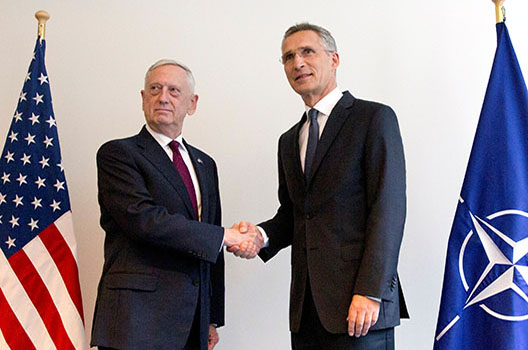 United States Secretary of Defense James Mattis passionately defended the necessity of international partnership in a June 15th speech at the commencement ceremony of the U.S. Naval War College in Newport, Rhode Island.
United States Secretary of Defense James Mattis passionately defended the necessity of international partnership in a June 15th speech at the commencement ceremony of the U.S. Naval War College in Newport, Rhode Island.
During the climax of his speech, Mattis invoked the memory of those from other countries who assisted American forces during the Revolutionary War: “down in Washington, D.C., four statues stand in Lafayette Square, overlooking the White House, and they are there as [a] reminder. These are statues of men who hailed from France, Poland, and Prussia, and they came — and I quote here from one of the monuments – ‘to offer their swords to the American colonies, serving as fellow laborers in the cause for liberty during our Revolutionary War.”
“These four men — Lafayette, Rochambeau, Kosciuszko, and von Steuben, serve as reminders, just as this War College student body does today, that America does not stand alone. No single nation resolves security challenges in this world.”
Mattis reminded the graduates that international partners would be crucial to their future success, saying, “for all the times that I was privileged to fight for America, I never fought in a solely American formation as a U.S. Marine. And seldom, if ever, will you, in your future leadership roles. . . find yourself carrying out your. . . mission without communication and collaboration across national lines.”
Mattis also had sharp words for the Russian Federation, which he said, “has been the nation that has redrawn international borders by force of arms in Georgia and Ukraine, while pursuing veto authority over their neighbors’ diplomatic, economic, and security decisions. Putin seeks to shatter NATO. He aims to diminish the appeal of the Western democratic model and attempts to undermine America’s moral authority. His actions are designed not to challenge our arms, at this point, but to undercut and compromise our belief in our ideals.”
Mattis also directed fire towards China, arguing that Beijing has “long-term designs to rewrite the existing global order.”
“The Ming Dynasty appears to be their model, albeit in a more muscular manner, demanding other nations become tribute states, kowtowing to Beijing; espousing One Belt, One Road, when this diverse world has many belts and many roads; and attempting to replicate on the international stage their authoritarian domestic model, militarizing South China Sea features while using predatory economics of piling massive debt on others.”
Mattis acknowledged the importance of a future U.S.-Chinese relationship, but cautioned that “it’s unrealistic to believe, today, that China will not seek to replicate its internal authoritarian model elsewhere, as it expands globally.”
Mattis also used his speech as an opportunity to highlight what he sees as the important successes of the Trump administration and his Department of Defense. On the potential breakthrough with North Korea, he said “President Trump’s historic summit with North Korean leader Kim Jong-un proves, and I quote here, ‘The past does not have to define the future.” He praised the “international coalition’s significant success against ISIS’ geographic caliphate” and promoted his department’s latest National Defense Strategy, the first “in over a decade. . . [filling] a vacuum, one of strategy-free actions.” This new strategy, Mattis explained, would focus on building the United States’ military force, “strengthening our military alliances. . . and modernizing the Department of Defense for greater performance, accountability, and affordability.”
Mattis finished his speech with one more rallying cry for international cooperation. He praised the Naval War College for its high percentage (twenty percent) of foreign students and implored the graduates to “carry these relationships forward. Reinforce them while forging new ones, for, by knowing how to fight well together, you strengthen deterrence and help to hold on to peace for one more year, one more month, one more week, one more day, as our diplomats work to solve problems.”
Secretary Mattis’ remarks can be found in full here: https://www.defense.gov/News/Transcripts/Transcript-View/Article/1551954/remarks-by-secretary-mattis-at-the-us-naval-war-college-commencement-newport-rh/
David Wemer is assistant director of editorial content at the Atlantic Council.
Image: U.S. Secretary of Defense Jim Mattis poses with NATO Secretary-General Jens Stoltenberg during a NATO defense ministers meeting at the Alliance headquarters in Brussels, Belgium, June 7, 2018. (REUTERS/Virginia Mayo)
